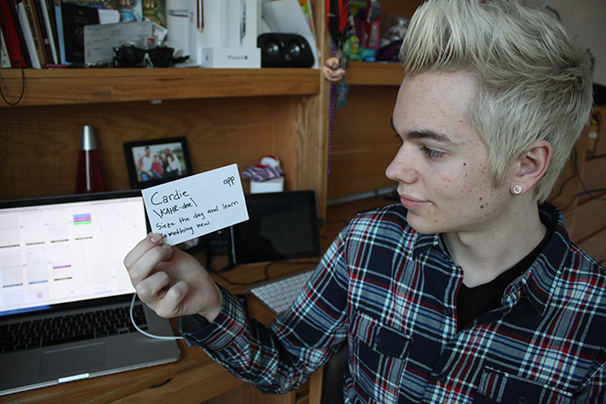
When he was 12 years old, CAS sophomore Tanner Nelson was given a book titled “How to Design a Webpage” to keep him occupied while at his father’s office. The book sparked a strong interest that prompted Nelson to teach himself how to code websites and apps by reading books and watching online tutorials.
Nelson used this self-taught knowledge to create Cardie, an iPhone app designed to teach users vocabulary over time through a series of scheduled activities. The app launched on Feb. 1 and is available for free on the iTunes App Store.
Cardie is designed to hold multiple sets of vocabulary words. After downloading the app, users choose from the “Word of the Day” set, the pre-uploaded pack created by Nelson, or sets they have created or found using Quizlet, which they can import. Nelson’s inspiration for the app stemmed from his failed attempt at learning one new word a day on dictionary.com as a high school student.
Every day, a card displaying a word and its definition is selected from the pack and three daily tasks are assigned to each word. The tasks allow users to memorize definitions by using words in various interactive ways.
Some activities include incorporating the word in a sentence, creating small rhymes or mnemonic devices and uploading a picture associated with the word. Users can choose from a list which three tasks they want to complete for each word set.
CAS sophomore Josefa Bitenc said using Cardie helped her learn Latin vocabulary without making flash cards because the activities were more effective than traditional learning styles.
“Learning vocab for your language class is never going to be the most fun thing in the world, but anything you can do to make it better, in my book, is a good idea,” Bitenc said.
The app also reminds users to complete their activities. Users create a schedule that consists of three alerts — one for each morning, afternoon and night. At the selected times, users are notified it is time to complete an activity.
Completed activities are submitted and then graded by other Cardie users, which adds a social networking aspect to the app. Users are rewarded for correct answers with points and an activity’s point value decreases as a task is submitted further from its scheduled time. Grading other people’s work also earns users points.
Currently, the points are for bragging rights only, but Nelson said he plans to eventually have unlockable prizes.
Nelson said Cardie is an effective learning tool because exercises are fun to complete and users cannot forget to review material.
“You try to cram but if you just do things throughout the day it really gets seared into your memory,” Nelson said.
In the future, Nelson wants to expand the kind of material available to learn through the app. For example, an interactive digital piano keyboard to teach users notes is a feature Nelson hopes to develop.
“I really want this app to be something that you can use to learn anything,” Nelson said.
Nelson, who initially wanted to study pre-med and computer science, said he aspires to create apps relating to bioinformatics, a field focused on organizing, storing and analyzing biochemical and biological information that will help medical professionals.
“I really want to take it to the next level and use apps and code to help save people’s lives,” Nelson said.
A version of this article appeared in the Tuesday, Feb. 18 print edition. Nicole Del Mauro is a staff writer. Email her at [email protected].
























































































































































